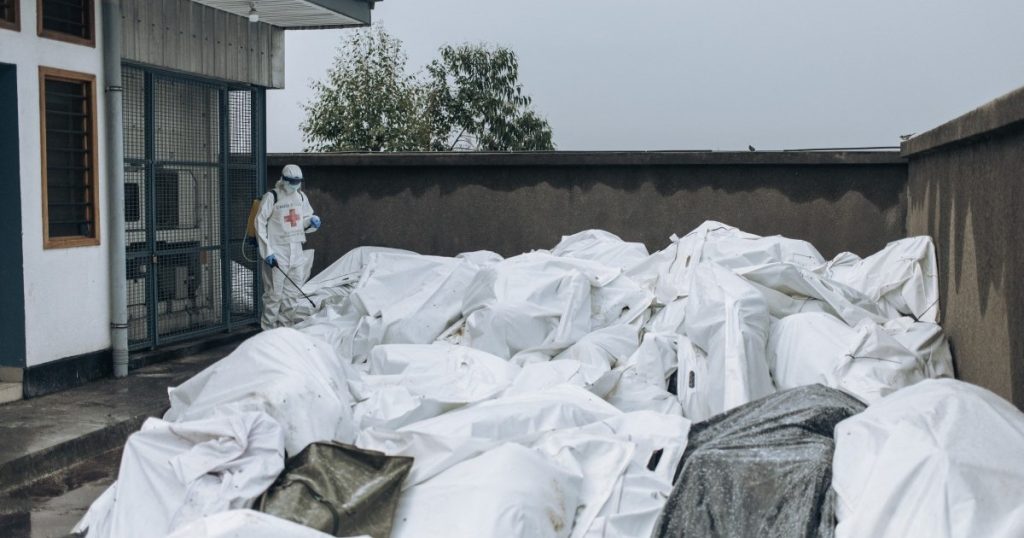The eastern Democratic Republic of Congo (DRC) is grappling with a devastating humanitarian crisis following the capture of Goma, its largest city, by the M23 rebels. The conflict, which has been simmering for over a decade, escalated drastically in recent weeks, resulting in a confirmed death toll of at least 773 individuals in Goma and its surrounding areas. This figure, however, is considered provisional by Congolese authorities, who suspect the actual number of casualties to be significantly higher due to reports of mass graves and the alleged removal of Rwandan casualties by the M23 rebels. The rebels’ advance, supported by an estimated 4,000 Rwandan troops according to UN experts, has dealt a severe blow to the Congolese military, leading to the loss of hundreds of soldiers and the surrender of foreign mercenaries. The capture of Goma has brought critical humanitarian operations to a standstill, impacting aid delivery across the entire eastern region of the DRC.
The M23 rebels, the most powerful among over a hundred armed groups operating in the resource-rich eastern DRC, have leveraged their backing from Rwanda to gain significant ground. This region holds vast deposits of minerals crucial for global technological industries, making it a strategically important area. The rebels’ rapid advance and the Congolese military’s weakened state have raised serious concerns about the potential for further violence and displacement. While the Congolese military has managed to reclaim some villages, the overall balance of power remains precarious. The humanitarian situation is worsening, with aid agencies struggling to reach vulnerable populations.
The return of some residents to Goma, prompted by the rebels’ promises to restore essential services like water and electricity, offers a glimmer of hope amidst the devastation. The city, however, bears the scars of the recent conflict, with streets littered with debris and the lingering stench of blood. The residents face the daunting task of rebuilding their lives and communities in the shadow of ongoing instability. The international community is watching the situation closely, with the UN expressing concern about the rebels’ continued advance towards Bukavu, the capital of South Kivu province.
The capture of Bukavu would represent a significant escalation in the conflict, potentially leading to further displacement and humanitarian suffering. The rebels’ rapid movement and the Congolese military’s struggles to contain them have created a volatile security situation. The UN peacekeeping chief has warned about the speed of the M23 advance and the strategic importance of the airport near Bukavu. Its capture would give the rebels control over a vital transportation hub and further solidify their grip on the region. The international community faces the challenge of finding a solution to the escalating conflict and preventing further humanitarian catastrophe.
The ongoing crisis in eastern DRC underscores the complexities of regional stability in Africa. The involvement of external actors, such as Rwanda’s alleged support for the M23 rebels, adds further layers of complexity to the conflict. The international community’s efforts to mediate a peaceful resolution have been hampered by the fluidity of the situation on the ground. The humanitarian consequences of the conflict are dire, with hundreds of thousands of people displaced and in need of assistance. The disruption of aid delivery due to the fighting exacerbates the already precarious situation, placing vulnerable populations at even greater risk.
The future of eastern DRC remains uncertain, with the potential for further violence and displacement looming large. The international community must redouble its efforts to find a lasting solution to the conflict, addressing the underlying causes of instability and ensuring the protection of civilians. The humanitarian crisis requires immediate attention, with increased funding and access for aid organizations crucial to alleviating the suffering of the affected populations. The restoration of peace and security in eastern DRC is essential not only for the well-being of its people but also for the stability of the entire Great Lakes region. The international community needs to exert pressure on all parties involved to end the violence and engage in constructive dialogue towards a lasting peace.

